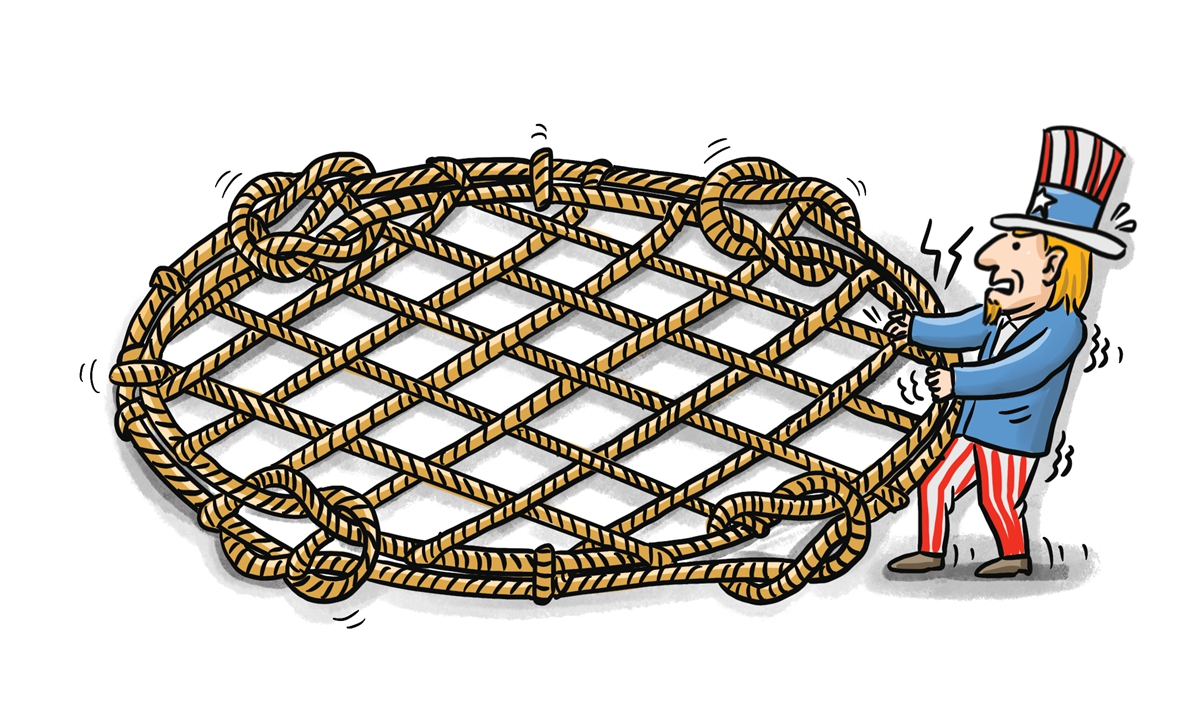
Illustration: Xia Qing/GT
The world's No.1 economy, the US, is trying to decouple with China, the second largest economy. But the US is neither the world's biggest trader nor the No.1 manufacturer.
Overall, the US foreign trade of goods shrank 8.8 percent in 2020 compared with the previous year, standing at $3.84 trillion. In the same year, China's foreign trade volume rose to $4.65 trillion, enabling it to become the No.1 trader in the world.
According to data published by the United Nations Statistics Division, China accounted for 28 percent of global manufacturing output in 2018, more than 10 percentage points ahead of the US. In 2010, China overtook the US to become the largest manufacturer in the world.
Of course, as the world's super power, the US is not only the biggest economic powerhouse, it also enjoys the world's most powerful financial, technological and military strengths, especially its top position in services and trade and the global manufacturing chain.
If the US decouples with China, it will form an unprecedented scenario in history - a scenario against the backdrop of deep globalization.
It is unimaginable if we consider the manufacturing chain. Can the high-end chain be separated with the middle- and low-end chain? That is not the decoupling between the US and China - it will be decoupling between the US and the world.
China plays an irreplaceable role in the global industrial chain thanks to its weight in manufacturing. Although China's position in the high-end chain is not at the top, it undeniably caters to the middle- and low-end chains, serving a more supportive role in global development and consumption.
The most critical part is this: China's advantage will not weaken due to US decoupling efforts with it. It will instead keep consolidating.
One of the most widely used medical instruments in response to the coronavirus is the oximeter. In India, for example, 98 percent of its existing oximeters are made in China.
The device, which measures the amount of oxygen in a patient's arterial blood, is not supposed to be too difficult to produce, but manufacturers outside China either lack the capacity to make the components and ingredients, or they can't sustain production because prices are much higher than that made in China.
The US policy of decoupling from China and containment will impose great constraints on China's advanced technology development. But low-end to mid-end production will also pose challenges for the US. This includes getting Apple to move its premium AirPods production line to Vietnam where it still needs a lot of Chinese-made equipment and accessories for production.
Apple is not capable of obstructing headphone research and development, production or work as original equipment manufacturers for other foreign companies in China. In the end, Chinese-made headphones will challenge Apple perfectly in terms of quality and quantity, as well as price.
The Biden administration has decided to invest in the high-tech sector on a large scale. This move could help cement US dominance in the tech sector. However, the basic equipment and facilities used by researchers, including their daily necessities and so on, are impossible to get rid of products made in China, unless Washington is determined to rebuild a large manufacturing industry.
The global manufacturing industry, especially that in East Asia, has a very close relationship with manufacturing in China. East Asia has become a global production base because of the cooperation of China's manufacturing industry. Open up an iPhone, in addition to being developed and designed in the US, its components are supplied by more than 100 suppliers around the world and assembled in China. There is no way these countries will decouple from China at the US' request.
The last two statistics are the most important ones to consider - First, China will overtake the US as the world's largest consumer within the next five years. Second, China's A share market is now the world's second largest market with the highest market value of stock, second only to the US, with huge growth potential.
US decoupling from China would divide the world. However, will this lead to a situation that the US does not even anticipate. Some industries and the countries that depend on these industries in China may decouple from the US in the future. This cannot be decided by the US holding up high the banner of ideology.
The author is a senior editor with People's Daily, and currently a senior fellow with the Chongyang Institute for Financial Studies at Renmin University of China. dinggang@globaltimes.com.cn. Follow him on Twitter @dinggangchina




